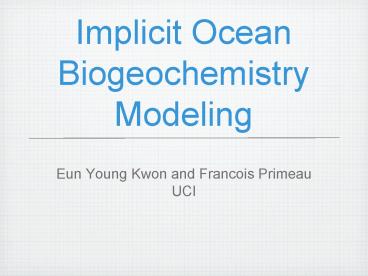Implicit Ocean Biogeochemistry Modeling
1 / 17
Title:
Implicit Ocean Biogeochemistry Modeling
Description:
The approach to equilibrium of the tracer transport equation is controlled by ... lifetime of DOP. fraction of new production allocated to DOP. phosphate ... –
Number of Views:106
Avg rating:3.0/5.0
Title: Implicit Ocean Biogeochemistry Modeling
1
Implicit Ocean Biogeochemistry Modeling
- Eun Young Kwon and Francois Primeau
- UCI
2
The Ocean Spin-up Problem
- The approach to equilibrium of the tracer
transport equation is controlled by the decay
rate of the transport operators slowest decaying
eigenmode (in models this decay rate is largely
controlled by the weak background diapycnal
diffusivity) - Spin-up typically takes 3000 years.
3
Because of slow spin-up
- We can typically only do a few runs
- We cannot easily optimize uncertain model
parameters, (especially true for parameters that
interact) - we end up using parameter values that are
suboptimal, this introduces biases in the model - We cannot easily quantify
- the uncertainty of model parameters
- the impact of parameter uncertainty on model
predictions
4
Implicit Ocean Model
3-D transport operator
biogeochemistry source-sink term
biogeochemical state of the model, i.e. 3-D
tracer fields
biogeochemical model parameters
Equilibrium condition
System of coupled nonlinear algebraic equations
Solve iteratively using Newtons Method
5
Newtons Method
Jacobian matrix (tangent linear model)
use a sparse linear solver to factor and invert
Iterate until
6
Newtons Method
- If method converges it is orders of magnitude
faster than time-stepping - Can always be made to converge by starting with a
good enough initial guess - Can be generalized to find periodic steady states
(i.e. seasonally varying solutions)
7
Example from a 3-D OGCM (No seasonal cycle)
- The OGCM is run to equilibrium (6000 yrs) and
time averaged velocity and diffusion tensor
fields are used in an offline model (Primeau
2005) no seasonal cycle - global model 3.75o x 3.750, 29 vertical levels
- KPP and GM mixing scheme
- OCMIP-2 ocean biogeochemistry formulation
- less than 45 minutes per equilibrium bgc solution
on an already old 1-cpu workstation
8
Phosphate
Equilibrium solution OCMIP-2
Observed
Equilibrium solution Optimized
9
Automatic parameter optimization
- Minimize cost function
a handful of bgc model parameters
phosphate, dissolved inorganic carbon,
alkalinity
10
Parameter optimization and parameter uncertainty
example
phosphate
lifetime of DOP
fraction of new production allocated to DOP
Vertical POC flux power law parameterization
exponent
11
Parameter Uncertainty example1. rain-ratio
molar ratio of POC to CaCO3 2. vertical POC
flux power-law parameterization exponent
ALKALINITY
Fraction of the observed spatial
variance captured by the model
DISSOLVED INORGANIC CARBON
PHOSPHATE
12
Parameter Sensitivity
Phosphate Sensitivity
Implicit function theorem
Jacobian matrix available in factored form from
Newton Solver
13
Parameter Sensitivity
14
Atmospheric pCO2
15
Future Work
- Proposal with Keith Moore to apply method to CCSM
Ocean model grid - Use Doney et al. (2006) OCMIPIron
biogeochemistry model with prognostic biological
production - Extend method to periodic steady states i.e. with
seasonal cycles.
16
Example from a periodic column model (iron
replete region)
17
Spin-up Time stepping versus Newtons Method






























